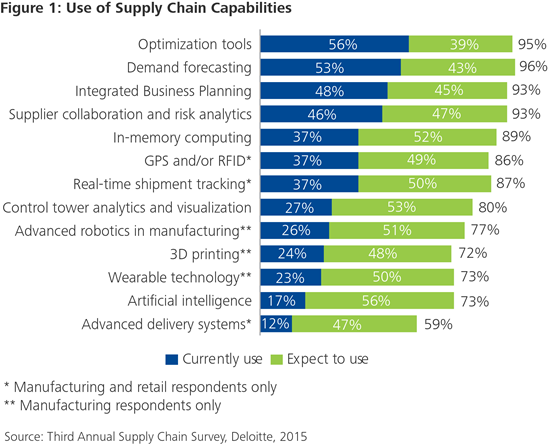News you can use: 7/22/2015

Photo: Nico Time, Flickr
- The End of Buying and Selling
Yet buying and selling became central enterprises of business over the course of the last century. Corporations focused on standardization—the Deming ideal—so needs became predictable enough to compare vendors directly, find the greatest price value through the routinized process of request for proposal (RFP), and thereby provide what everyone needed. Buying became the science of squeezing price, sales the art of justifying price, and both functions grew into large organizations. Business is getting too complex and dynamic for centralized buying and selling machines. What’s more, the strategic sourcing initiatives of the past two decades all but erased margins for high-volume suppliers. When the absolute floor is the baseline, there is no need to sell, per se. There is only a need to serve. In fact, there is a heightened need to serve. The only way to differentiate a company is in helping customers profit through the use of products.
http://www.sdcexec.com/article/12091986/the-end-of-buying-and-selling
- 7 Mentors You Didn’t Even Know You Had
You want to build an awesome business right? Then you need to understand how to create an awesome customer experience. Well, you’re a customer too right? Most of what I’ve learned about customer service has been from being a customer. I look at each person or company I buy from as a mentor because they help me create better experiences for my customers by creating a good or bad buying experience for me.
http://www.entrepreneur.com/article/247900?ctp=BizDev&src=Syndication&msc=Feedly
- McDonalds vow to end deforestation in its global supply chain
Applying throughout the entire supply chain, the core principles and practices of McDonald’s commitment on deforestation include: No deforestation of primary forests or areas of high conservation value; No development of high carbon stock forest areas and no development on peatlands regardless of depth, and the utilization of best management practices for existing commodity production on peatlands.
- 83% of supply chain executives report lackluster performance as they struggle to get to grips with effects of globalization
Supply chains are being held back by the effects of globalization, according to a new survey, with 83% of executives from leading enterprises claiming to see only average or poor performance. Over 60% said this is primarily due to the number of partners involved and the risks this creates, which is in turn limiting their flexibility.
- ORACLE CLOSES ITS CLOUD PROCUREMENT GAPS
The two new services include the Order Management Cloud and the Global Order Promising Cloud. Together, they offer order management, visibility and order fulfillment capabilities, the company said. But to go a step further, Oracle’s new services connect businesses’ current sales and order processes in its Configure, Price and Quote Cloud product and their current packing and shipping services in the Inventory Cloud product, all to Oracle’s billing in the Enterprise Resource Planning Cloud.
http://www.pymnts.com/news/b2b-payments/2015/oracle-closes-its-cloud-procurement-gaps/
Video: Should Competitors Share Information?
Podcast: IBM: Preserving an Italian Culinary Treasure with Data Analytics
News You Can Use: 7/1/2015

- 6 Life Hacks Learned in Prison That Will Maximize Your Productivity
I’ve learned to think diligently about my thoughts, and use them to communicate more effectively. Writing can help you organize your thoughts better and actually helps you to be a better verbal communicator. Start with communicating to your team via email, send emails to partners about discussions and/or send emails to your spouse when working through tough decisions.
http://www.entrepreneur.com/article/247779?ctp=BizDev&src=Syndication&msc=Feedly
- The Rise Of Trust (And Speed) In Supplier Enablement (Coupa’s Adam Alphin to look at the future of supplier enablement.)
Simply put, it’s injected trust into a conversation that previously felt like buyers were cornering or holding hostage their supply base. This trust has resulted in higher engagement, much higher participation in e-invoicing, and get this…suppliers becoming change agents within our customers organizations! We believe the conversation must change from “Here is a web portal that you’ll be charged to use, you’re now required to use it to be our supplier” to “Here are our business objectives we think are in both of our best interest, here are a series of tools we’re providing (for free!) so we can help each other achieve those objectives.”
- ‘The Irrigation Effect’: Why Your Employees Aren’t Getting the Message
Many leaders are surprised to learn that they are the barriers. We assume that we’ve communicated effectively when, in reality, the information we share is sparse, insufficient, infrequent, or simply inaccurate. Keep in mind that between the source of the water and the end of the row, the water may have to pass through multiple channels before it arrives. If managers don’t make a conscious effort to facilitate the flow of information, rather than obstruct it, vital communication is likely to dissipate before reaching those parts of the field where it is needed most.
http://www.entrepreneur.com/article/240849?ctp=BizDev&src=Syndication&msc=Feedly
- Supply Chain Talent Crisis Looms
Years of headcount reduction, training budget cuts, and the retirement of highly skilled individuals have all contributed to the shortage of supply chain talent. At the same time, a combination of accelerating technology development and widespread experimentation with new operating models are expanding the scope of supply chain operations, creating a demand for new types of supply chain employees—a trend that is only expected to accelerate in the future. “Margins are so thin in many industries that any technology or operational change that can provide a competitive advantage—whether its 3D printing or advanced analytics—is critical. And those capabilities are inherently dependent on talent,” explains Kelly Marchese, a principal and supply chain leader with Deloitte Consulting LLP.
http://deloitte.wsj.com/cio/2015/06/25/supply-chain-talent-crisis-looms/

- Are the days of global supply chains numbered?
In Global Supply Chains: New Directions, the Standard Chartered Bank acknowledges that several macroeconomic trends, such as increasing urbanization, more sophisticated communications technology, and lower oil prices, continue to support the growth of global supply chains. Yet at the same time, other trends are creating a sort of headwind that is slowing the pace of growth. For example, automation and robotics are improving, making it easier for companies to stop chasing low-cost labor abroad and bring their manufacturing operations back to local markets. Increasing concerns about sustainability and the high carbon footprint of global supply chains may also be dampening global supply chain growth. Some companies are interested in shortening their supply chains to avoid the risk of disruptions due to a natural disaster or civil unrest half a world away.
http://www.supplychainquarterly.com/news/20150624-are-the-days-of-global-supply-chains-numbered/

